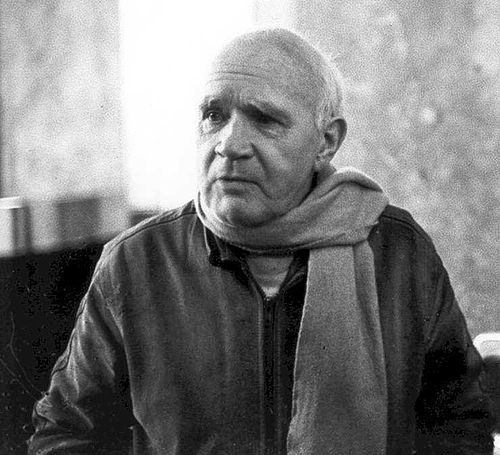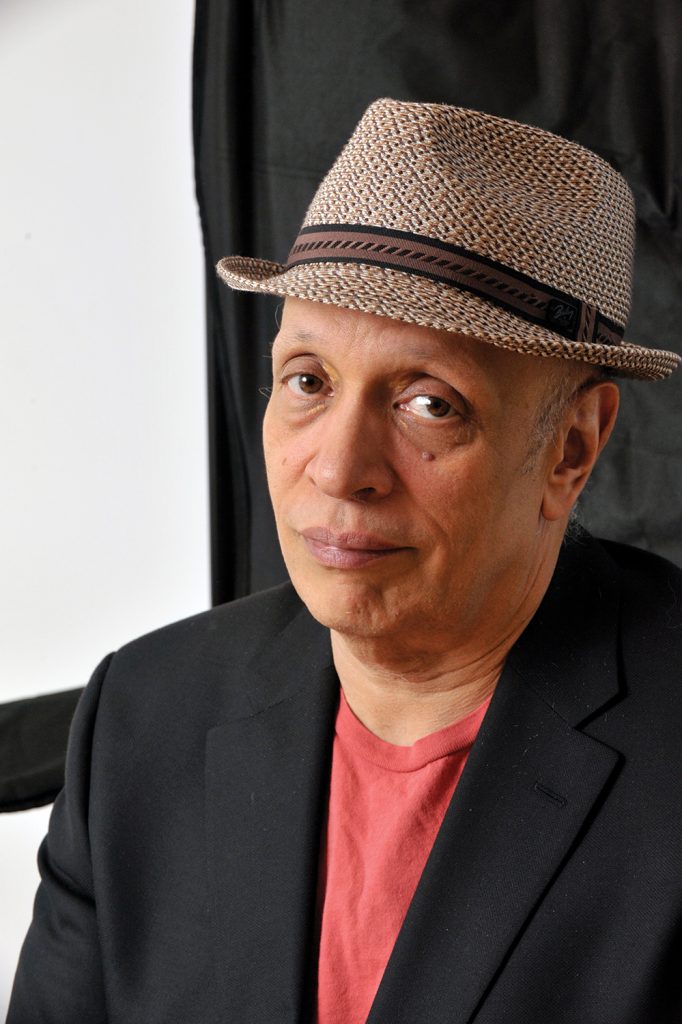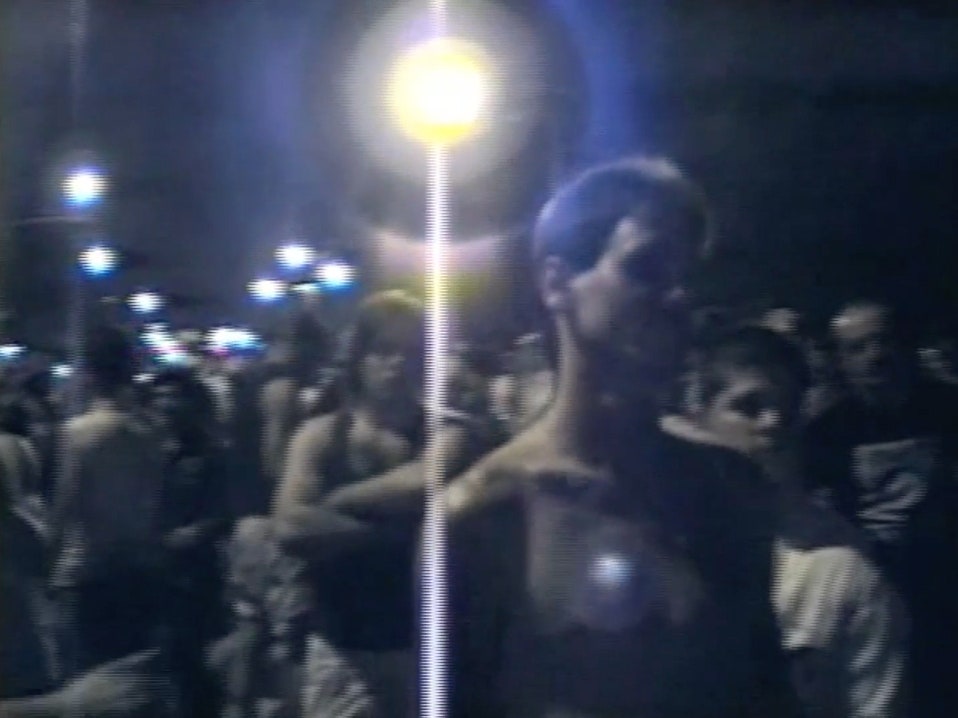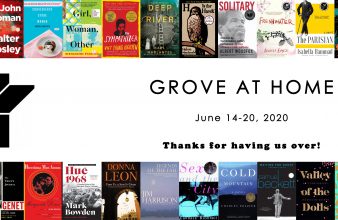News Room
Welcome to Grove at Home!
Every weekday, from now until we’re all out of the house again, we’ll be sharing a couple of links — some fresh, some from the vault — to say hi, remind you to keep reading, and let you know what’s on our minds.
Friday, June 5
Antoinette Nwandu, Inspired by Beckett and Young Black Men
In this clip, playwright Antoinette Nwandu discusses the inspiration behind her stinging, remarkable Pass Over, whose inspirations include Beckett’s Waiting for Godot, the Biblical Exodus story, and, as she explains here, seeing the interactions between a young Black student and the prison system. It’s a play that, in Nwandu’s words, “asks us collectively to consider the value of Black lives — specifically the value of the lives of young, Black men.
Akwaeke Emezi: “There is, in fact, no canon we cannot touch.”
When we first published it in 2018, Akwaeke Emezi’s Freshwater made a sensation with its brilliance, its courageousness, and, frankly, its incomparability to pretty much any other book in the world. The week of its release, Emezi also published a stunning essay in Buzzfeed, in which they laid bare some of their own process in conceiving and writing the book, expressed the “wary hope that space will be made for writers of color working in the experimental,” and tackled the thorny problems of canonicity and whose stories get told. Two years later, it’s no less urgent a read.
“My childhood can be measured easily, in pools of light spilling onto pages and books blanketing the surfaces of our house in Aba, Nigeria. When the electricity died, as it often did, I read by candlelight or with a flashlight balanced against my body…” Continue reading…
Bernardine Evaristo speaks from home
In this footage shot on Wednesday, Bernardine Evaristo, author of the Booker Prize-winning Girl, Woman, Other, describes the importance of her study, doing away with full stops, how the response to her books has changed over the years, and a great deal more. Girl, Woman, Other follows the lives of twelve Black British folks — eleven women and a non-binary person — centering voices that have all too often been othered, with insight, wit, and gorgeous complexity.
https://www.youtube.com/watch?v=9EI9ibDo-Zw
Thursday, June 4
Lauren Francis-Sharma and Tiphanie Yanique search for “home” in the Americas
Last month, the brilliant Lauren Francis-Sharma (Book of the Little Axe) spoke with Tiphanie Yanique (Land of Love and Drowning) in a Crowdcast event hosted by the Center for Fiction. Their conversation covers a huge range of fascinating subjects, including land ownership and “the way Europeans have put the laws into effect to take land away from people of color”; Edward Rose, the real-life, Black Crow chief whose improbable life testifies to the racial complexities and hybridity of life in the nineteenth-century American West (“when I found him, I knew that this story wanted to be told”); and much more.
The Harvard Crimson reports Jean Genet’s analysis of the Black Panther Party
In 1970, Jean Genet decided that the struggle for racial justice in America had grown so urgent that, though the United States had barred him from entry, he would travel here illegally to speak in favor of the Black Panther Party, which he called the most “brilliant, luminous, and poignant part of American society.” The story that covered his speech at Harvard for the school newspaper, the Crimson — which is riddled with flaws, including a failure even to reproduce the names of the Black Panther Party officials with whom Genet shared the billing — is, nonetheless, an astonishing historical document that shows how much has changed, and how much as remained the same, in our political rhetoric over the past half-century.
“‘The trial of all political activism in this country started with the trials of the Black Panthers.’ French playwright Jean Genet told an overflow crowd at M.I.T.’s Student Union last night.” Continue reading…
Amiri Baraka interviewed in 1972
In mid-March 1972, around ten thousand Black folks gathered in the city Gary, Indiana for the National Black Political Convention, a convocation to discuss the problems facing Black communities, strategize for increasing Black representation in elected office, and more. Attendees included Rev. Jesse Jackson, U.S. Representative Charles C. Diggs, Jr., and — no surprise — the peerless American poet Amiri Baraka, a co-founder of the Black Arts Movement and an indispensable, critical voice in American public life for more than fifty years. The convention produced the Gary Declaration, a vital statement of principles for the Black liberation movement in America. Shortly after the Convention ended, Baraka appeared on the TV show “Black Journal,” to talk with Tony Brown about what had happened, what it had meant, and what the future had in store (“a well-organized, evolving political structure,” he hoped).
Wednesday, June 3
Gil Scott-Heron: “No hot water, no toilets, and no lights / But Whitey’s on the moon”
It’s hard to imagine a rumination on racialized inequality with more charm, wit, or sting than Gil Scott-Heron’s classic “Whitey on the Moon.” It appeared on his 1970 debut album, Small Talk at 125th and Lenox, released after Scott-Heron had already published a poetry collection and a novel. This version includes some… hilarious visual flourishes.
Walter Mosley: “I am the N-word in the writers’ room”
Late last year, Walter Mosley — a bona fide legend of American fiction — wrote candidly and angrily in the New York Times about having been fired from a job writing for TV after using the N-word — while telling a story about his own harassment, as a Black man, at the hands of police. It makes for electrifying, admirably good-humored, deeply important reading.
“There I was, a black man in America who shares with millions of others the history of racism. And more often than not, treated as subhuman. If addressed at all that history had to be rendered in words my employers regarded as acceptable.” Continue reading…
Amiri Baraka: “I was named by the man who buried Malcolm X”
Although he’s not around to speak truth during our current crises, few writers have produced work as critical to understanding America’s entrenched inequalities — racial, economic, ideological, and more — than Amiri Baraka. A poet, playwright, and actor, Baraka was one of the founders of the Black Arts Movement and served for a time as poet laureate of New Jersey. Today, Baraka’s son, Ras J. Baraka, does the family name proud as mayor of Newark, New Jersey. Here’s a fantastic segment that Democracy Now! put together to celebrate Baraka’s life and legacy shortly after he died, at the age of seventy-nine, in 2014.
Tuesday, June 2
Sarah M. Broom on Writing her Memoir
Last summer, on the day we released her debut memoir The Yellow House (coming in paperback next month, by the way), Sarah M. Broom spoke with staff at Entertainment Weekly. The book, a unique account of growing up the youngest of twelve in a shotgun house in New Orleans East, went on to win rare critical acclaim and a National Book Award. In addition to the story of its author’s upbringing, it is also a book about race, class, and place, about the depredations of inequality and their emotional aftermath. It’s a book like no other. In this brief clip, Broom talks candidly about the courage it took to write this searing, memorable work.
Emily Raboteau on the History of Bystander Recordings
The country is reeling from the effects of a recording made by bystanders of the conduct of four Minneapolis police officers, one of whom now stands accused of murder. Just a few years ago, American Book Award-winner Emily Raboteau wrote for the New Yorker on “the long, vital history of bystander recordings,” considering the Bronx Documentary Center’s “New Documents” show, which covered incidents from Clayton Patterson’s 1988 recordings of police violence in Manhattan’s Tompkins Square Park to Rodney King and all too familiar a list of more recent names — Philando Castile, Alton Sterling — as well as many from deeper in history. It’s hard to imagine a more sadly relevant read.
“Since the advent of social media, in the past decade, ordinary people have sparked grassroots movements for social, economic, democratic, and environmental change by uploading and sharing videos via YouTube, Facebook, and Twitter. But, as ‘New Documents’ shows, recent examples of eyewitness testimonies are part of a wide-ranging and long-standing lineage of citizen journalism from across the globe.” Continue reading…
On Frantz Fanon’s Conception of Violence
Few figures have had a larger impact on the history of thinking about colonialism, race, and democracy than Martinican psychiatrist and philosopher Frantz Fanon. In his short life (he died of leukemia in 1961 at only thirty-six), Fanon wrote a number of revolutionary texts that, more than half a century later, remain absolute cornerstones of anti-colonial thinking, and essential classics of political philosophy. In this short, entertaining video, the team at “Three-Minute Thought” offers a useful condensation of some of Fanon’s ideas about colonialism and violence.
Monday, June 1
Claudia Rankine on Whiteness as a Brand
Here’s the inestimable Claudia Rankine, speaking as part of a panel assembled by the New Yorker about whiteness as a brand. “For the first time I think we’re in a place where we can begin to think about what structures whiteness, what presumptions does the white imagination move forward with?” A short and helpful clip.
Roxane Gay on the Long Wait for Black Liberation
This weekend, in the New York Times, the singular Roxane Gay offered up a searingly candid portrayal of the outlook for racial justice in America. Everyone in this country should read it.
“After Donald Trump maligned the developing world in 2018, with the dismissive phrase “shithole countries,” I wrote that no one was coming to save us from the president. Now, in the midst of a pandemic, we see exactly what that means.” Continue reading…
Albert Woodfox on his Four Decades in Solitary and his Life Afterwards
Albert Woodfox survived more than forty years in solitary confinement, for a crime he didn’t commit. Finally released in 2016, the Black Panther Party member wrote the Pulitzer- and National Book Award-shortlisted memoir Solitary to describe how courage, hope, and solidarity sustained him. Last year, he discussed the book with Amy Goodman of Democracy Now!. “The purpose of solitary confinement is to destroy the human spirit, to destroy your sense of self-worth, to destroy your sanity… I’ve heard phrases like ‘no more than fifteen days.’ For me, one day in solitary confinement is too much.”












